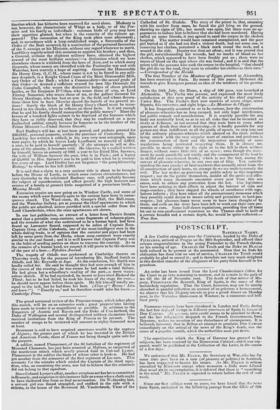The grand autumnal review of the Prussian troops, which takes
place this month, will be on an extensive scale ; great preparations having been made to render it as magnificent as possible. In addition to the . Emperors of Austria and Russia and the Duke of Cumberland, the Duke of Wellington and several distinguished military characters have received invitations from the King of Prussia to be present. The number of troops to be reviewed will amount to eighty thousand men at least.
Bourmont is said to have acquired enormous wealth by the capture of Algiers ; the greater part of which lie has invested in the British and American Funds, those of France not being thought quite safe for the purpose.
A soldier, named Flamecourt, of .the 3d battalion of the regiment of Mounted Chasseurs, has just been arrested at Malines, as suspected of the murderous attack which nearly proved fatal to Colonel Lyster. Flamecourt is the soldier the blade of whose sabre is brola n. He had got another from the armourer of the first regiment of Lat.cers. This accounts far the mistake which misled the Captain of the third squa- dron, who, on-examining the arms, was led to believe that the criminals did not belong to that squadron.
Since Colonel Lyster's affair, another atrocious act has been committed in Brussels ; and suspicion in this instance falls on a man whose cloth ought to have sheltered him from so foul an accusation. On Wednesday last, a servant girl was found strangled, and stabbed in the side with a stiletto, in the house of -the Reverend M. -Vanderbroelty Vicar of 'the
Cathedral of St. Gudule. The story of the priest is, that, returning with his mother from mass, he found the girl lying on the ground, showing no signs of. life ; her mouth was open, but there were no ap- pearances to induce him tobelieve that she had been murdered. Having called on some friends, it was agreed to send the corpse to the cholera hospital. The matter would have remained unexplained, and the poor girl buried as if she had not died a violent death, had not some one, in removing her clothes, perceived a black mark round the neck, and a wound in the side. Inquirywas then set afloat; and it was proved that the girl, notwithstanding her wounds, bad no marks of blood on her clothes, which appeared to have been freshly put on ; there were no traces of blood on the spot where she was found ; and it is said that the priest told the persons who took the corpse to the hospital, " that should the girl die on the road, they were to consider her clothes as their own." —Correspondent of the Herald.
The first Number of the Moniteur of Egypt, printed at Alexandria, has been received in Paris. By means of this paper, Mehemet Ali intends to give European powers an idea of the tendency of his govern- ment.
On the 18th July, the Horns, a ship of 100 guns, was launched at Alexandria. The Pacha was present, and expressed the most lively satisfaction at this new proof of the activity of his chief engineer, Carisy Bey. The. Pacha's -fleet now consists of seven ships, seven frigates, five corvettes, and eight brigs. —Le Moniteur de tEgypt.
It has frequently occurred to us to be curious, how the construction of pleasure-wherries has so long escaped, not only legal interference, but public remark and consideration. It is scarcely possible for any body not nautically bred, so as to set all risks that can be incurred on rivers at defiance. or not assured that they were born to some other species of death than that of drowning—it is hardly possible for any person not thus indifferent to all the perils of upsets, to step into one of the ordinary pleasure-wherries which abound on the river, without being struck with the very singular want of caution and prudence in the construction of them and the imperative necessity of some regulations being instituted respecting them. It is almost im- possible to move either to the right or to the left in them without danger, without some little risk of an upset ; even though the move- ment be made guardedly and warily, and the management of the boat be in skilful and experienced hands ; which is not the fact, among the rowers of pleasure-wherries, in one case out of fifty. Yet, notwith- standing the vast number of fatal accidents that annually occur from the ill-construction of such boats, no attempt do we see made to remedy the evil. The law makes no provision for public safety in this impormnt respect ; nor do the public themselves, amidst all the perils and afflic- tions which many thousands encounter every year from this one
cause, seek to obtain any protection from the law. Uur legislators have been untirinr, in their efforts to adjust the balance of cabs and stage-coaches ; they have clogged the wheels of omnibuses with regu-
lations infinite ; they have taken all the precautionary measures which they possibly could devise to insure safety and protection to land-pas- sengers ; but pleasure-boats never seem to have been thought of by them, and evils on the river have been left to work out their Own pre- vention or cure. Some half-dozen regulations, providing that all boats let out to non-professional watermen on the Thames shall be built of a certain breadth and a certain depth, &c. would be quite sufficient. — True Sun.


















 Previous page
Previous page